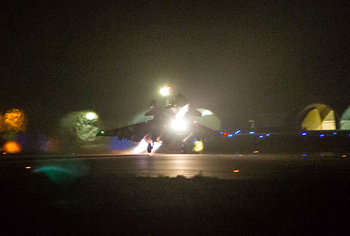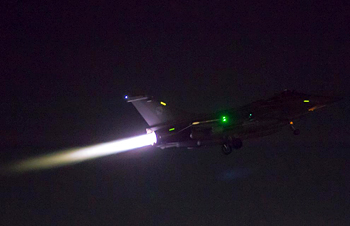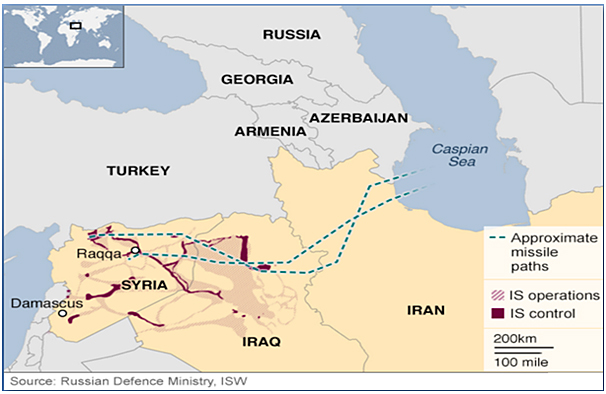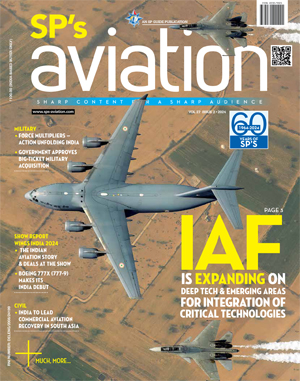INDIAN ARMED FORCES CHIEFS ON
OUR RELENTLESS AND FOCUSED PUBLISHING EFFORTS

SP Guide Publications puts forth a well compiled articulation of issues, pursuits and accomplishments of the Indian Army, over the years

I am confident that SP Guide Publications would continue to inform, inspire and influence.

My compliments to SP Guide Publications for informative and credible reportage on contemporary aerospace issues over the past six decades.
Airstrikes on ISIS
The world must acknowledge that ISIS may have 14th century ideology but it has access to technology and weaponry of the current century.
 |
By Lt. General P.C. Katoch Former Director General of Information Systems, Indian Army |


Photo Credit: www.defense.gouv.fr
Air strikes against the ISIS have been intensified. The massive US-led coalition had been doing this since past year plus. The Russian intervention in Syria this year was not only because Russia has a strategic interests in the region, maintains a strong naval base and Syria pressed from three directions was beginning to lose much more territory but because the extraordinary large presence of Taliban in Northern Afghanistan and consolidation of ISIS in Afghanistan is threatening Russian interests, with Russia already forced to increase its troop strength in Tajikistan with whom they have a military arrangement. Taliban may have withdrawn somewhat from Kunduz after mass destructing bulk of the city but they have captured Warduj district east of Kunduz and Ghormach district of Faryab province having consolidated in Badakshan region of northern Afghanistan, far beyond their usual southern strongholds, fully backed by Pakistan.
France went for massive airstrikes on Raqqa (purported HQ of ISIS) post the multiple terrorist strikes in Paris on November 13. Russia ushered a new dimension in the Syrian conflict by firing cruise missiles from warships based in the Caspian Sea some 26 cruise missiles fired by last count. The Russian strikes on the ISIS reportedly inflicted much casualties and chaos in the ISIS rank and file causing some of their cadres to flee into neighbouring countries like Jordan. But then came the tragedy of a Russian civil airliner breaking up midair over Egypt killing all 224 on board with ISIS claiming responsibility for the terrorist action. Russian anti-ISIS determination has naturally gone up with resolve to trace out and eliminate the perpetrators who are responsible for downing the civil air-liner.

But all said and done, the bottom-line is that if aerial bombings could kill terrorist organizations, then Al Qaeda and Taliban would have been dead and gone long since. Estimates were expressed some years back that average life of a terrorist organization or insurgency is generally around 40-50 years but that was in the context of movements that did not have growth rate as fast as the ISIS. Then, in the case of ISIS, the organization in Iraq-Syria was permitted to mingle with a population of six-seven million, advertently or inadvertently, before any worthwhile action, particularly air-strikes were undertaken against them. So, not only is it near impossible to finish them off with such intermingling but the borders with all the neigbouring countries too are porous. Earlier opportunities to inflict heavy casualties on ISIS were missed. When 10,000 ISIS cadres emerged from the blue and captured Mosul, there were no airstrikes against them worth the name. Worse was post capture of Mosul when their victorious convoys were advancing along the highway, they were not bombed despite repeated requests by Iraq to the US. Even later, while photographs of victory parades by ISIS post capture of other cities were being flashed all over social media, these congregations were never bombed. The fact remains that the world is not together in its fight against ISIS. At the recent G-20 Summit, President Putin stated that some 40 countries including G-20 members continue to support ISIS. He also shared satellite and aerial photographs showing tanker convoys stretching over kilometers, collecting oil from ISIS held areas. There have been earlier reports that ISIS is smuggling out and selling oil to the tune of US$ 2-3 million on daily basis obviously with connivance of the US-led coalition. Then you also have cases like Turkey which joined the coalition but is actually acting against the Yezdis in pursuit of her own national interest.
| Airstrikes have to be accompanied with ground action but also multiple actions of cutting of finances, access to weapons and ISIS’s ability to rapidly multiply its rank and file through propaganda. |
So, airstrikes may be good to inflict casualties at random and save use of firing ranges in one’s own country but will not make much dent overall albeit the chaos and destruction would boost weapon sales. Airstrikes have to be accompanied with ground action but also multiple actions of cutting of finances, access to weapons and ISIS’s ability to rapidly multiply its rank and file through propaganda. The world must acknowledge that ISIS may have 14th century ideology but it has access to technology and weaponry of the current century. Besides, through internet and social media, their propaganda machinery has been able to attract young, educated and committed followers even from other faiths, examples being the Australian preacher Musa Cerantonio of Irish-Italian parentage and the Hindu Siddhartha Dhar (Bihar-Bengal origin) from Britain who converted to Abu Ramaysah after being recruited by Anjem Chaudary and is now based in Syria. Globally, the mistake of not striking ISIS when it initially raised its head in Iraq-Syria is being repeated in other regions as well. ISIS has already captured seven districts of Nangarhar province west of Peshawar, having invested these areas from Pakistan, not Iraq-Syria. Hekmat Khalil Karzai, Deputy Foreign Minister of Afghanistan says, “ISIS is operating in different parts of the country, particularly in Nangarhar and Zabul provinces in eastern.” The ISIS in Eastern Afghanistan, particularly Nangarhar (west of Peshawar) has been inducted through Pakistan, not Iraq-Syria. ISIS-TTP sanctuaries inside Pakistan continue to flourish. Couple of cruise missile strikes on these sanctuaries would not only shake them up but make the Pakistani military think again before continuing with its state policy of terror.





